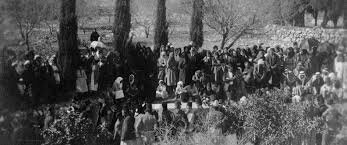Amid the myriad political, technological, and socio-economic changes in the world in the first half of the 1800’s, there were also religious expectations in the Christian and Muslim worlds based on prophecy in the Bible and the Quaran. On May 23, 1844 a young man introduced himself as the fulfillment of Christian and Islamic prophecy. As ‘Abdu’l-Bahá summarized:
‘23 May, the anniversary of the message and Declaration of the Báb. It is a blessed day and the dawn of manifestation, for the appearance of the Báb was the early light of the true morn, whereas the manifestation of the Blessed Beauty, Bahá’u’lláh, was the shining forth of the sun. Therefore, it is a blessed day, the inception of the heavenly bounty, the beginning of the divine effulgence. On this day in 1844 the Báb was sent forth heralding and proclaiming the Kingdom of God, announcing the glad tidings of the coming of Bahá’u’lláh and withstanding the opposition of the whole Persian nation.’
In his book “God Passes By,” Shoghi Effendi, the Guardian of the Bahá’í Faith, recounts that exact moment which Bahá’ís now celebrate:
‘The opening scene of the initial act of this great drama was laid in the upper chamber of the modest residence of the son of a mercer of Shiraz, in an obscure corner of that city. The time was the hour before sunset, on the 22nd day of May, 1844. The participants were the Báb, a twenty-five year old siyyid,(descendent of Muhammad), of pure and holy lineage, and the young Mullá Husayn, the first to believe in Him. Mulla Husayn recounts:
“I sat spellbound by His utterance, oblivious of time and of those who awaited me,” he himself has testified, after describing the nature of the questions he had put to his Host and the conclusive replies he had received from Him, replies which had established beyond the shadow of a doubt the validity of His claim to be the promised Qa’im. “Suddenly the call of the Mu’adhdhin, summoning the faithful to their morning prayer, awakened me from the state of ecstasy into which I seemed to have fallen. “This Revelation,” Mullá Husayn has further testified, “so suddenly and impetuously thrust upon me, came as a thunderbolt which, for a time, seemed to have benumbed my faculties. I was blinded by its dazzling splendor and overwhelmed by its crushing force. Excitement, joy, awe, and wonder stirred the depths of my soul.”
In the coming days 18 other individuals declared their belief that Ali Muhammad,(Báb), was indeed the ‘Promised One’ and they were sent out across Iran to bring the message of the Báb. The Báb continued to speak and write throughout His six years of ministry, explaining the prophecies, enduring persecution, imprisonment and execution preparing His people and the world to receive ‘He Who Was To Come’ (Bahá’u’lláh).





